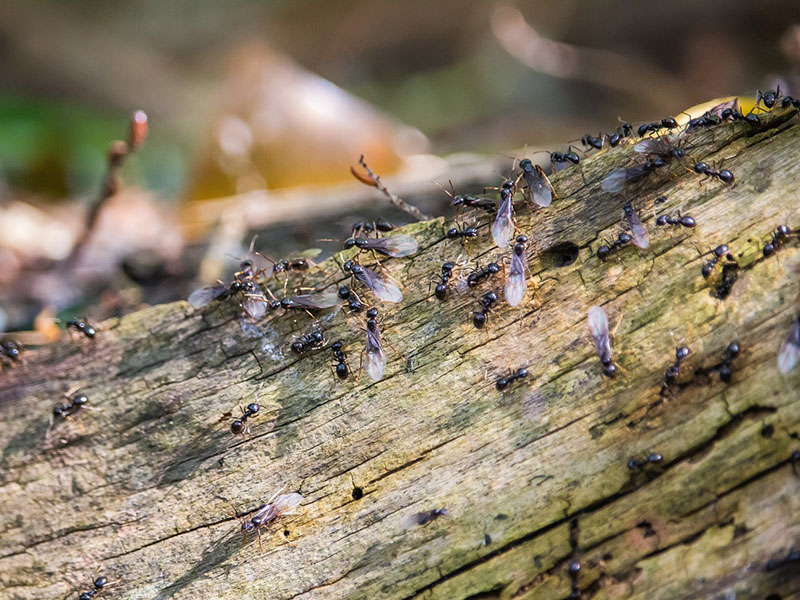As summer approaches, a familiar yet perplexing sight graces the skies of the UK: swarms of flying ants taking to the air. These annual ant ‘hatchings’ can be a source of fascination and frustration for many. But what prompts this natural phenomenon? In this blog post, we delve into the world of flying ants to uncover the reasons behind their sudden appearance, their life cycle, and how to deal with them.
What Causes Flying Ants in the UK?
The phenomenon of flying ants, also known as the “nuptial flight,” occurs when young queen ants and male ants leave their nests in search of mates. This typically happens during warm, humid summer days. The synchronized emergence of these winged ants from multiple colonies creates the striking swarms that can sometimes alarmingly fill the sky.
The exact timing of this event is influenced by a variety of factors including temperature, humidity, and even wind conditions. Ant colonies seem to have an uncanny ability to coordinate their flights, which often leads to multiple colonies releasing their winged ants on the same day. This behavior has evolved to increase the chances of successful mating and genetic diversity.
What Do Flying Ants Turn Into?
Flying ants are not a separate species; they are regular ants in their reproductive stage. The winged ants you see are young queens and male ants. After mating in mid-air, the males die shortly thereafter. The fertilized queens shed their wings and begin the process of establishing new colonies. These queens dig small burrows in the ground, lay eggs, and care for the initial brood of worker ants until the colony is established.
How Many Days Do Flying Ants Last?
The flying ant phenomenon can last for several days, with the peak usually lasting for a few hours to a day. The swarms appear suddenly and can cover large areas, attracting the attention of birds, which feast on this temporary abundance of food. After this brief but intense period, the ground becomes littered with discarded wings as the queens shed them to start their underground colonies.
What Gets Rid of Flying Ants?
Dealing with flying ants can be a nuisance, especially if they invade your living space. Here are some methods to manage their presence:
- Prevent Entry: Seal cracks and openings in doors, windows, and walls to prevent ants from entering your home.
- Cleanliness: Keep your home clean and free of food debris. Regularly empty trash bins and wipe down surfaces to reduce the attractiveness of your living space to ants.
- Natural Repellents: Some natural repellents like vinegar, lemon juice, or peppermint oil can deter ants. However, these might not provide a long-term solution.
- Ant Bait: Use ant bait stations to attract ants away from your living areas. These stations contain poisoned bait that the ants carry back to their colonies, which can help eliminate the entire colony.
- Professional Help: If the ant infestation becomes overwhelming, consider seeking assistance from professional pest control services.
Do UK Flying Ants Bite?
While flying ants are not typically aggressive and do not sting, they can bite if they feel threatened. Their bites are usually not very painful and rarely cause serious harm. However, some individuals might experience mild allergic reactions to ant bites. It’s best to avoid handling them and to use caution when trying to remove them from your home.
Where Do Flying Ants Go When They Leave the Nest?
After the nuptial flight and successful mating, the fertilized queen ants go on a mission to establish new colonies. They search for suitable nesting sites, which often involve finding underground areas where they can dig burrows. Once they’ve selected a spot, the queens shed their wings, which they no longer need, and begin laying eggs to initiate the colony’s growth.
Conclusion
The annual appearance of flying ants in the UK is a fascinating natural event that reflects the intricacies of ant behavior and reproduction. While their swarms might be a temporary inconvenience, understanding the reasons behind their sudden appearance and knowing how to manage their presence can help us coexist harmoniously with these industrious insects. As summer arrives each year, take a moment to appreciate the remarkable cycle of life that plays out in the skies and underground, as flying ants embark on their journey to establish new colonies and continue their vital role in the ecosystem.
Contact FurBeGone Pest Control
FurBeGone Pest Control only uses humane methods to remove and deter pests from your home or business. Our team of experienced pest control specialists will assess the severity of the infestation and recommend the best course of action to remove the pests and prevent future infestations.
We also provide ongoing maintenance contracts to help ensure that your property remains pest-free. Our goal is to provide our clients with a comprehensive and effective pest control solution that is tailored to their specific needs.
If you’re experiencing pest problems in your loft or attic, contact FurBeGone Pest Control today. Our team of experts will be happy to provide you with a free, no-obligation quote and answer any questions you may have about our services.
FurBeGone Pest Control offer a free survey before, and treatment is undertaken. We cover Stevenage, Letchworth, Hitchin, and surrounding villages and treat all types of pests including insects, rodents and wildlife. We are also bed bug specialists and provide 100% guarantee on our treatments.
Contact us through our website here or for 24-hour callout please call us on 01438 387005.
You can read our Google reviews here. We have 5 stars!

